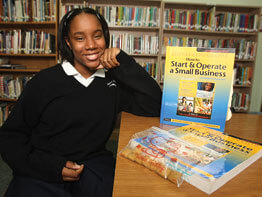Alayna Albertie makes and sells homemade dog biscuits, and she promises they’re far superior to anything you can get in the grocery store.
Her customers know this, she says, because their dogs do.
This bodes well for Alayna’s Barking Biscuits, the fledgling company she started before turning 13.
Alayna, a seventh-grader at Mother Seton Academy in Baltimore, has repeat customers. She has profits. And she has business smarts that go beyond what you learn from a textbook.
“It’s far more fun to learn this way than the old-fashioned way,” Alayna said.
She credits the National Foundation for Teaching Entrepreneurship, a New York-based nonprofit that brought its program this school year to Mother Seton and another Baltimore Catholic school, St. Frances Academy. NFTE, which has been operating in Baltimore public schools since 2002 and nationwide since 1987, provides entrepreneurship education programs to students from low-income neighborhoods.
The students get hands-on experience developing a business based on their passions and expected demand, and work on their strategy with business experts, mentors and their NFTE-trained teacher.
Students then complete a formal business plan and defend it before a three-member panel of business executives, describing their business, customers, motto and competitive advantage.
Alayna kept it simple and direct: “My dog was very hungry one day, and I decided to try out a dog biscuit recipe, which I made myself. My dog loves it.”
She betrayed no trade secrets but took the opportunity to say – politely – that stuff in stores isn’t even close.
Other students have started companies selling customized greeting cards or offering dance lessons, dog-walking or baby-sitting
Students immerse themselves in the nuts and bolts of business: financing, cost-benefit analyses, supply and demand, sales and marketing, return-on-investment, profits and losses.
“NFTE teaches the kids so many different things,” said Mother Seton’s Sister Joan Warner, a Daughter of Charity who attended training last summer to receive certification to teach the program. “It involves a lot of critical thinking, analyzing, synthesizing.”
That, of course, entails a whole lot of research, math, reading, writing.
NFTE’s emphasis on ethics ties in well with the Catholic focus on ethics at Mother Seton, Sister Joan said.
“We try to impart values,” she said. “We really promote social responsibility and what is just, what is legal.”
All students, for example, must agree to donate a portion of earnings to charity.
NFTE students from Mother Seton and St. Frances got a taste of negotiating and pricing in New York last month. Each student received $50, from a state grant, to spend in the city’s wholesale district to buy materials for their businesses.
Guest speakers from the business world visit classes and help students develop their business ideas, and the students visit businesses including M&T Bank and First Mariner Bank.
Whatever business students pursue, experiential learning makes all the difference, said Patricia Granata Eisner, executive director of NFTE Baltimore.
“It changes attitudes in students,” she said. “It re-engages students in school because it gives them something that’s a real-world experience.
“There is only so much you can tell them. By showing them, students get excited about creating something for themselves. And knowing that they can earn money and do it for themselves not only gives them confidence, but also prepares them for the real world.”
NFTE has programs in 22 U.S. states and 12 other countries. Since its founding, NFTE has taught more than 230,000 young people from low-income communities – 4,800 of them from Baltimore – and has more than 1,300 Certified Entrepreneurship Teachers.


